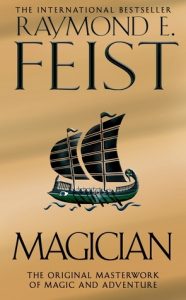Magician by Raymond E. Feist
 I first discovered ‘grown up’ fantasy fiction at the age of twelve, when I first read Tolkien’s The Lord of the Rings. However, it wasn’t until I was seventeen that I realised – shock horror! – that there were authors other than Tolkien writing for this genre. This is when a friend introduced me to the works of Raymond E. Feist. For several months I proceeded to chain-read most of the then-published novels in his Riftwar cycle – beginning, of course, with Magician – before moving on to discover other authors. Since then I seem to have more or less left Feist behind me.
I first discovered ‘grown up’ fantasy fiction at the age of twelve, when I first read Tolkien’s The Lord of the Rings. However, it wasn’t until I was seventeen that I realised – shock horror! – that there were authors other than Tolkien writing for this genre. This is when a friend introduced me to the works of Raymond E. Feist. For several months I proceeded to chain-read most of the then-published novels in his Riftwar cycle – beginning, of course, with Magician – before moving on to discover other authors. Since then I seem to have more or less left Feist behind me.
It’s now been more than eight years since I first read Magician, and I’m really keen to revisit a series of which I have so many fond memories, and which captivated my imagination at a time when elves and dwarves and magic were still relatively new to me. So, without further ado, here are my thoughts on Magician, book one of the Riftwar Saga.
Magician is ultimately a tale of two boys, Pug and Tomas, as the war in their kingdom forces them to leave their humble beginnings and embark on adventures that will change them both forever. Tomas follows a dark path in an attempt to become a warrior of legend, while Pug is, of course, the eponymous magician. As the title would suggest, there is a much heftier focus on Pug, with Tomas’ storyline relegated to more of a side quest. Pug is a likeable and sympathetic protagonist – despite the distractingly ridiculous name – and his journey is full of twists and turns and is a lot of fun to follow. We see him grow from orphaned keep boy to court squire, and from there to a dedicated student of magic, if only an average one; we then follow him in his misfortunes as he is made a slave in an alien land, and finally have the satisfaction of seeing him rise and embrace the role of master magician.
But the story is not entirely about Pug; the narrative follows many other characters in order to explore the physical and political impact of the war on both the societies involved, and the plot is as much driven by events as it is by characters. Magician rather ambitiously spans a timeline of just over a decade, and the author smoothly segues between time frames of months and sometimes years. However, there are times when it can feel as though those months have been spent reading the book in real time: many minor or inconsequential parts of the story are narrated in great detail when they could have been omitted altogether, and there are a great many scenes involving travelling – either by boat or horse – that become something of a chore to read. The prose is frequently laborious and somewhat repetitive, particularly in the early stages of the book, and the narrative favours a ‘tell’ rather than ‘show’ type of storytelling that occasionally had me muttering, Monty Python-style, “get on with it!!!”.
Despite this, there are more than enough redeeming features to make Magician worth toiling through. As I’ve already mentioned, most of the characters are likeable (I myself am particularly fond of Arutha and Laurie), and the world is immersive and three-dimensional. I particularly enjoyed all the references to nuances of the Tsurani homeworld, which Feist later covered in much greater detail in the sequel trilogy titled Empire. Amidst all the rambling lies a story that is hopeful and compelling, and which contains one of my favourite scenes ever (two words: arena destruction); and although I’m a little disappointed that Magician’s narrative is slower and denser than I remember, I’m excited to have delved back into the series. Oh, Pug, I’ve missed you!
